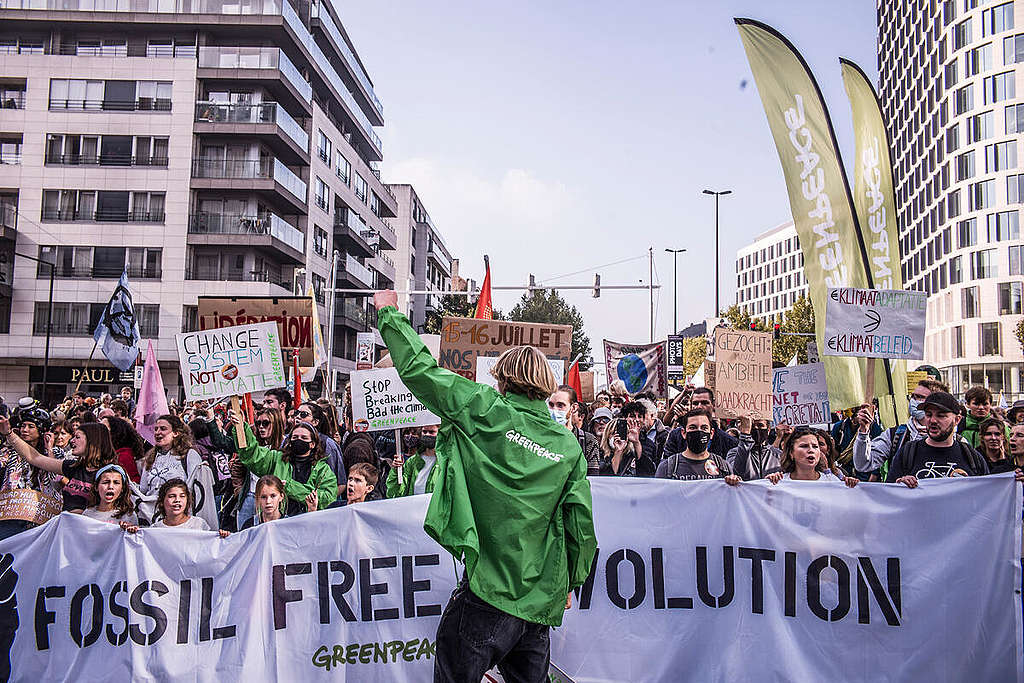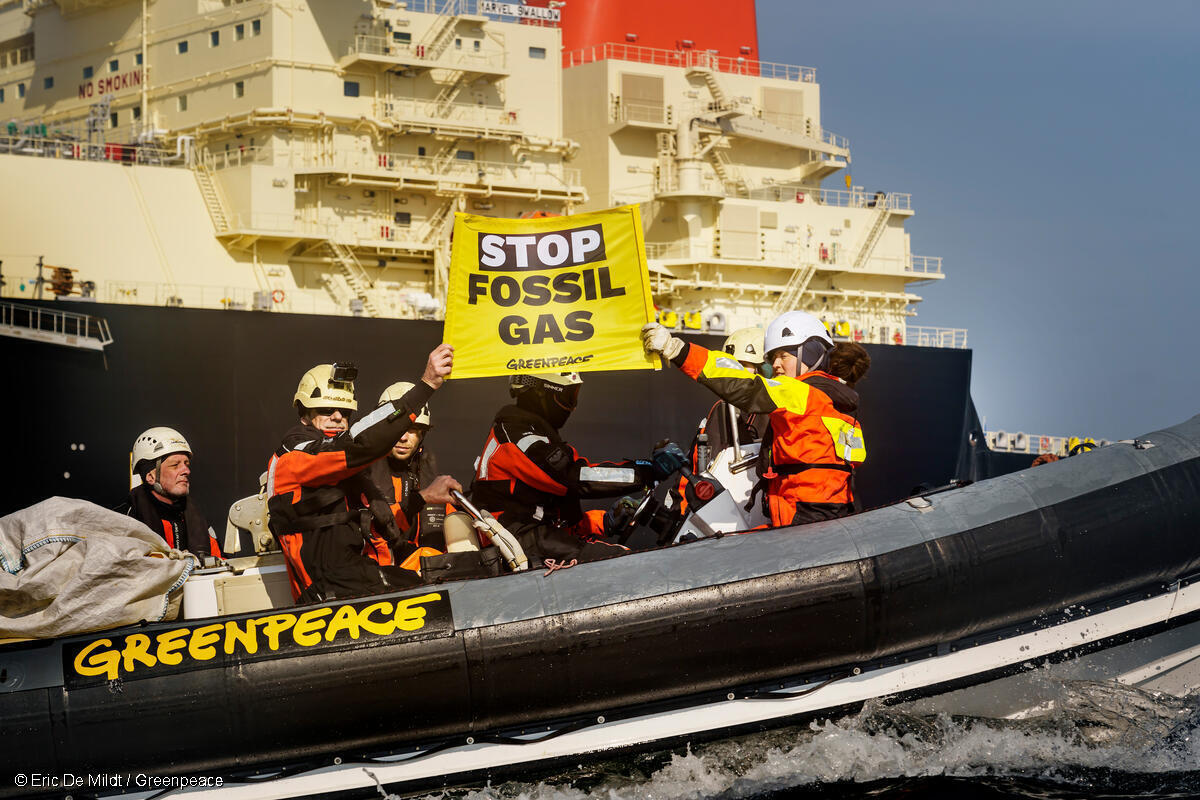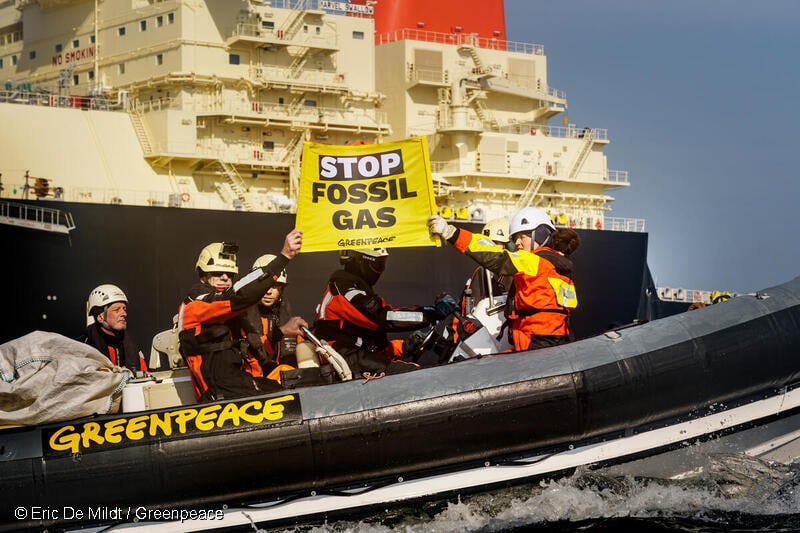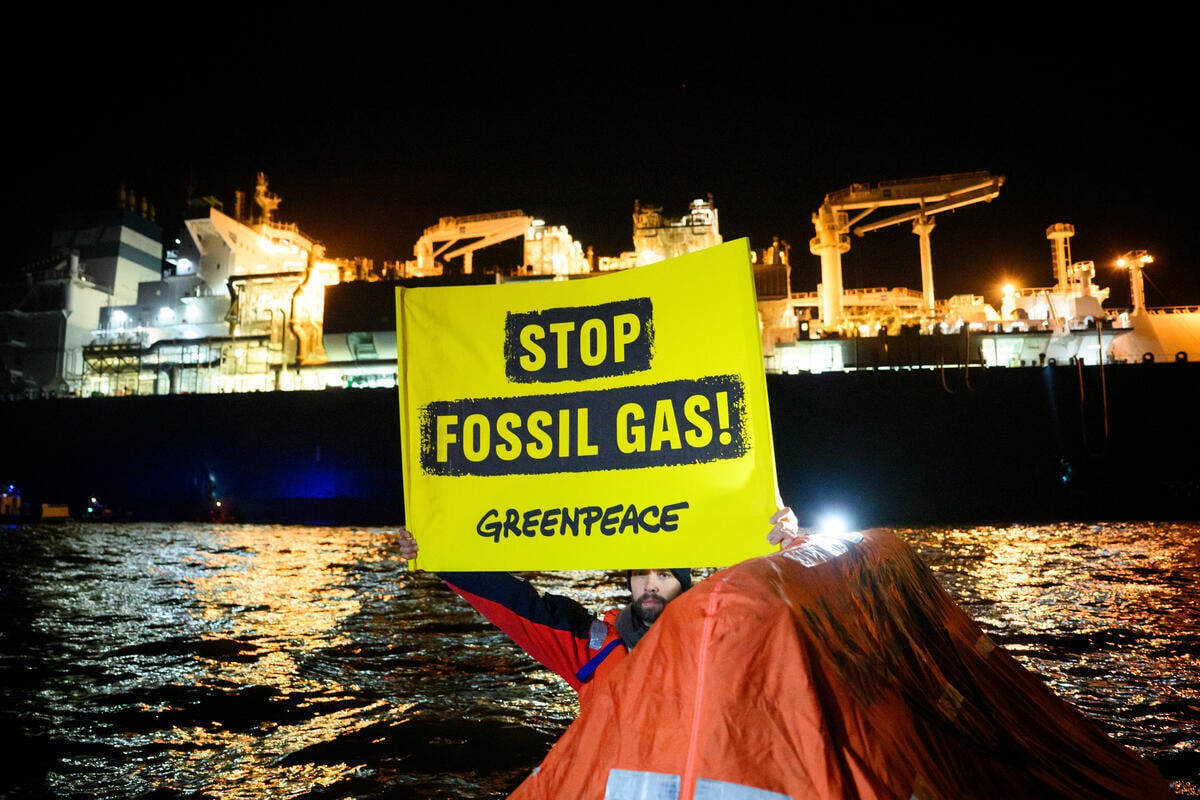
When I curled up on the sofa for a cosy night in to watch ‘Don’t Look Up’ this Christmas I expected to watch a ‘Love Actually’-esque, high-budget, celebrity-packed cast deliver a mediocre comedy. But I left with a surprising mix of emotions, bittersweet, with a deep sense of relief.
Why? For the first time a Hollywood star-studded satire has given millions of people all over the world a clear insight into what indigenous and environmental activists and scientists face every day. An existential threat to our planet met with denial, delay and deception by those with the power to take action to protect our planet, layered with rage and grief at the preventable loss of a livable world.
Something we at Greenpeace don’t talk about much is the deep sense of climate anxiety and unbearable frustration at the heart of the tireless campaigning of so many front-line communities, activists and scientists. We are in a bizarre place in the climate crisis: the public are more aware and concerned than ever, activists and scientists have been sending grave warnings for decades, politicians and corporations keep publicly advocating green initiatives and yet the planet keeps on burning. How have we come this far?
One reason is, as Don’t Look Up depicts, some powerful corporations are able to prevent meaningful political action that could avert disaster as critical as a deadly comet by spreading dangerous lies. This is what is hiding behind the greenwashing of corporate PR campaigns.
When I try switching off after work by scrolling through Instagram or watching TV, I am faced with a tidal wave of bare-faced lies from fossil fuel, airline and car companies. This week the Guardian found that fossil fuel firms are among the biggest spenders on Google ads, with some adverts promoting dangerous activities such as fracking as safe.
Greenpeace-commissioned research found that companies like Shell and Total use adverts to promote a variety of false solutions as ‘green’, like presenting ‘natural gas’ as climate friendly. These ads trickle into political choices, such as the EU Commission’s recent decision to include fossil gas and nuclear in the EU’s sustainable investment guidelines, the taxonomy which is supposed to support the EU’s green deal.
Just like in Don’t Look Up, we know how bad the problem is and we have the solutions to avert disaster. Yet vested corporate interests are manipulating pivotal decisions for our future, veering us away from safety and towards destruction.
We are in a scary situation. As climate disasters increase, more and more people are facing huge climate anxiety. Don’t Look Up was the first time I have ever seen climate anxiety portrayed in a big budget film, and honestly I could really relate to Jennifer Lawrence’s character. When politicians characterised by Meryl Streep delay climate action by “sitting tight” and prioritise decisions based on political convenience over life on earth, it can be infuriating as well as deeply depressing. In a recent media training I was told to make sure I smile and nod in interviews, but this can feel incredibly difficult when, as Leonardo Dicaprio and Lawrence’s character experienced, an existential issue feels repeatedly downplayed or ignored. A recent Imperial College study demonstrated that climate anxiety is a serious mental health issue, and I can relate to that. Standard life choices like having children feel trivial and impossible when I imagine the dystopian world I know I’ll experience in my lifetime. We desperately need to support this growing problem for our wellbeing, and to regain our much needed stamina to fight this crisis and challenge those responsible for it.
What makes this climate anxiety even worse is that some of the world’s most polluting companies make us believe that solving the climate crisis is primarily our responsibility as individuals. When BP hired an ad agency to help them create the ‘carbon footprint’ calculator in 2004, their goal was to make individuals feel personally responsible for the climate emergency, whilst distracting our attention away from the ‘carbon footprint’ of one of the world’s biggest oil companies. The sad news is that it works. In a recent survey, Greenpeace found that over half of our Gen Z supporters felt that changing their habits as individuals is the most important step to counter climate change, as opposed to the 100 companies that contribute to 71% of global emissions changing their ways. Once again, big businesses have successfully lied to us, avoiding accountability for their human rights records, gaining more license to burn fossil fuels, and plunging us into climate catastrophe.
Just like in Don’t Look Up, solutions, science and activism alone are clearly not enough. Those blocking necessary action need to be confronted to tackle the lack of political will, shortsightedness, corporate collusion, the prioritisation of profit and flat out dishonesty. This week the Director and Producer of Don’t Look Up came out in support of a fossil advertising ban, a clear sign of the crew’s concern around fossil fuel companies’ propaganda machines and their destructive effect.
But the good news is that we understand the web of power that Don’t Look Up displays so well, and we have a tool to get around it. When the tobacco industry was taken down in Europe less than 20 years ago, the first piece of the puzzle was excluding companies from advertising and sponsorships. Without that they had no platform to deny the health impacts of smoking or to promote dangerous products, which led their political influence and social acceptance to wane.
Now it’s time to stop some of the world’s most polluting companies from advertising and sponsoring with a very similar law. Now is the time to stop the greenwashing that is accelerating the climate crisis.
As Don’t Look Up conveys, the complex web of power and collusion can make political action hard. But the good news is that we don’t have to wait for politicians to act. Greenpeace and more than thirty other groups are backing a European Citizens’ Initiative to ban fossil fuel advertising and sponsorships. If we get to 1 million signatures, the European Commission has to consider tabling a new law. We could remove one of the world’s most deadly industries from public platforms, stop their manipulative messages and deeply damage their political credibility.
While it’s true that there will be many more fights to stop the climate crisis after this win, and a lot more climate anxiety to face in the coming years, I know at least that stopping this dangerous industry’s lies would help me sleep at night.
Georgia Whitaker is lead campaigner, Fossil Free Revolution.



